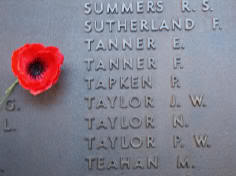Paul Tapken
| Alias | Tapkin |
|---|---|
| Russian spelling | Павел Федорович Тапкен |
| Born | 1890 |
| Place | Baku, Azerbaijan, the Caucasus |
| Ethnic origin | Russian / German |
| Religion | Church of England |
| Father | Theodore Tapken, St Petersburg |
| Mother | Clara Tapken |
| Contacts | Cousin Waldemar Franz von Kroeber |
| Arrived at Australia |
from Bremen on 20.04.1914 per Greisenau disembarked at Fremantle, WA |
| Residence before enlistment | Wilga, Perth, WA |
| Occupation | 1914 clerk, 1915 labourer |
| Naturalisation | Served as Russian subject |
Service #1
| Service number | 3940 |
|---|---|
| Enlisted | 25.11.1915 |
| Place of enlistment | Perth |
| Unit | 28th Battalion |
| Rank | Private |
| Place | Western Front, 1916 |
| Final fate | KIA 29.07.1916 |
| Memorial | 26 Villers-Bretonneux, France |
Materials
Digitised service records (NAA)
Digitised Embarkation roll entry (AWM)
Digitised Red Cross wounded and missing file (AWM)
Blog article
Newspaper articles
Bunbury's volunteers for Australian expeditionary force. - Southern Times, Bunbury, 13 August 1914, p. 5.
From Russian Anzacs in Australian History:
Paul Tapken, another bomber, [...] was reported missing during this attack [Somme]. Enlisting as a labourer from Perth, he had originally come from the Transcaucasian city of Baku, probably from a family of Russian German merchants engaged in the oil trade. And, as so often happens with the Russian Anzacs, the thoughtlessness of the authorities -- epitomised by Kovalsky's lonely death, thrown overboard when no longer wanted by the war machine -- is offset here by the careful concern of Tapken's comrade L/cpl Lucien McBride. In his letter to the court of enquiry McBride began, 'I shall be lengthy in this letter as through brevity, some small matter may be missed which may be of interest to his people in Russia'. He described the night attack: 'At midnight we commenced to attack exchanging compliments of good luck and all appeared in high hope as to success. Halfways, about 200 yards, we began to separate owing to pitch darkness. ... It was just here that I saw the last of Tapkin.' In conclusion, probably out of the same concern he felt for the Russian's distant family, he gave a word-picture of Tapken: 'He was slow in his speech, a trait in his character, and he never became excited or lost his temper'. From other soldiers we learn that his nickname was 'Tap'.
Gallery

AWM memorial panel 114
 Russian Anzacs
Russian Anzacs